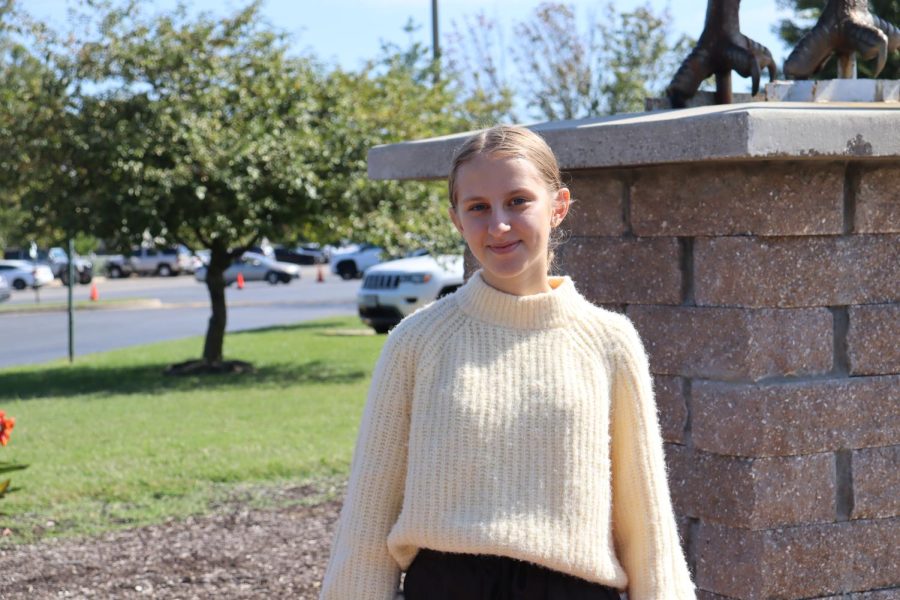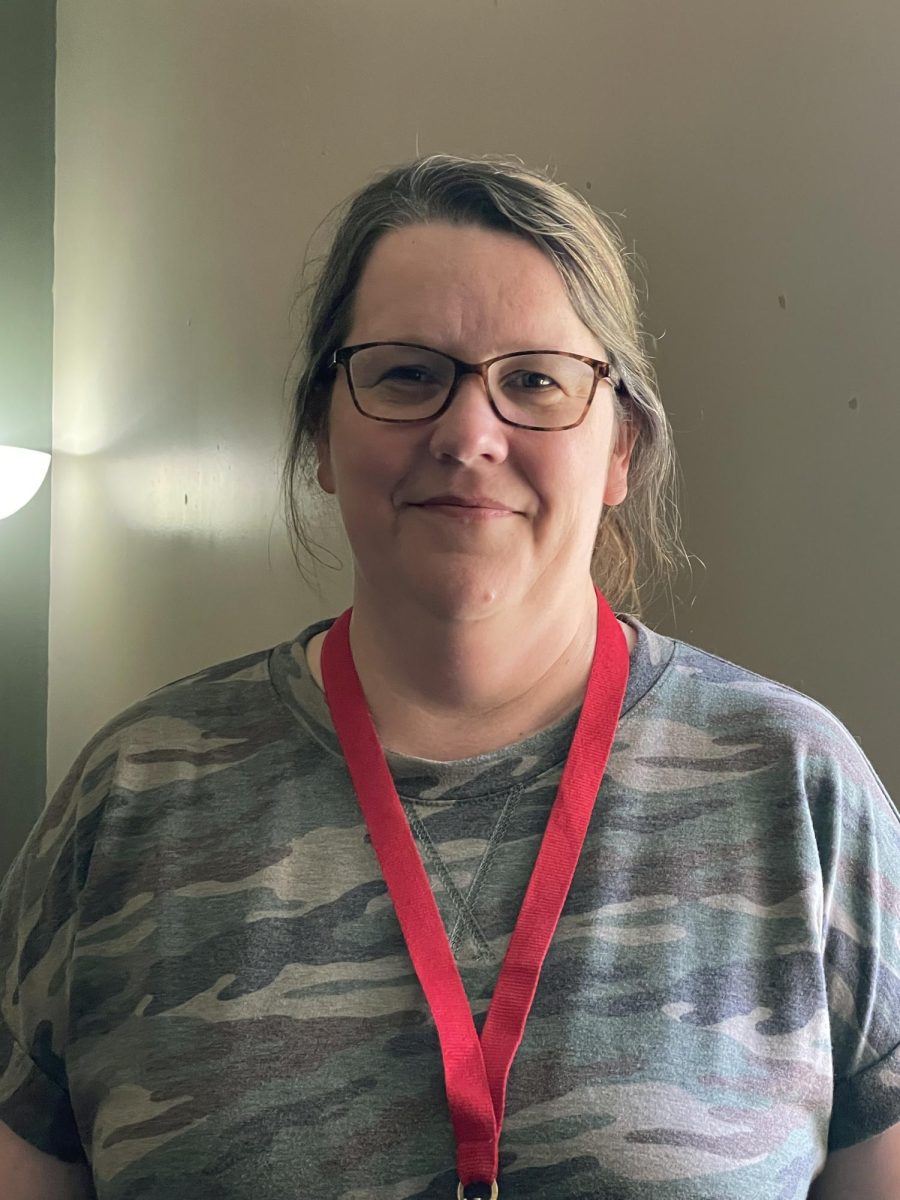From Ukraine to Nixa
October 27, 2022
As the war in Ukraine carries on, more and more people have left their home country to find a more suitable living space. In July, it was estimated by the United Nations that 12 million people had fled Ukraine, and that number has only increased since then. While many refugees decided to stay within Europe, many have ventured further into the United States; more specifically, Missouri. Four Ukraine refugees are Nixa High School students; one of whom is sophomore Kamila Mykytiuk, who now lives in an environment unlike anything she’s had to experience before.
“I am from the west part of Ukraine, in the city of Chernivtsi,” Mykytiuk said. “Everything is different [from the U.S.] — to the schools to the people to even the doors which we open differently.”
Mykytiuk endured numerous obstacles that she and her family faced during the early stages of their departure.
“Getting here was so difficult, everything was done in panic,” Mykytiuk said. “We got here from Romania by [taking] four planes, and with our family having three children it was really hard to take our baggage because we didn’t have enough space for everything, so we didn’t take a whole lot of things.”
Mykytiuk will be living in the Nixa area until the war ends, but while in the U.S., she hasn’t stopped thinking about the world she left behind.
“Ukraine is home [and it] is where my heart is,” Mykytiuk said. “It’s the place where I grew up, the place where God and I grew up, the place where I met my first friends, the place where I took my first steps and the first place I learned to love people.”
While her family waits for the war to end, Mykytiuk will attend school here at Nixa, which has programs in place to help those who come from different countries get more acquainted with using English daily. Krista Stone is the English learner teacher at both Nixa High and Junior High schools. She goes back and forth between schools helping international students adjust to the new environment.
“[I deal with] about eight different languages [each day],” Stone said. “I love learning about and meeting people who have different cultures than my own and I learn a lot from them.”
Because of the many cultures Stone deals with daily, her roles change throughout the district for each student.
“I am responsible for looking into any student that has marked that they speak another language at home or if their first language is something other than English,” Stone said. “I’ll then send home an English language survey asking how much the other language impacts their life and then based on that information I screen them to see if they need English language assistance.”
Each student under the English language assistant program has come to Nixa for many different reasons, but for the Ukrainian students, the main reason has been family.
“We have a lot of students who have come to America because of what has been going on in Ukraine for several months now,” Stone said. “A lot of them have come to this area in particular because of family members or because there is such a strong Slavic community in this area so they have support and they have people that can help them maneuver their way into the United States.”
The transition doesn’t guarantee comfort, as many of those who have relocated have found out.
“There’s also the problem of trying to find jobs,” Stone said. “We have families that had good jobs and big houses in Ukraine and here they have small houses and they’re crammed in. So while basic needs are being met, they’re not getting anything extra like they would be used to.”
Beyond Nixa, there have been many Ukrainians and refugees from across the world that are facing the same challenges. City of Refuge, an organization based in Columbia that helps refugees land on their feet in America, has helped coordinate the increasing need for resources.
“City of Refuge is preparing for the Columbia area to receive more Ukrainian refugees,” Dan Szy, Director of Development at City of Refuge said. “Our organization has consulted with community leaders in Sedalia to strategize about ways to welcome Ukrainian refugees and provide an infrastructure of support.”
There also are instances where Russians and Ukrainians are in the same community. This could be seen as a contentious issue, however, Stone said the issue isn’t as big as one would think.
“We also have an interesting situation in that we have a large Slavic population which means we have lots of Russians that live here as well,” Stone said. “So there was that question about how well they would be received and how well they’d get along and we’ve found that it isn’t an issue at all.”
Because of the local community surrounding those from Ukraine, the support they get is valued, yet there are still barriers when it comes to how the rest of the United States feels about them.
“You can’t be as friendly as you were in Ukraine, you can’t understand all the things, and you feel like you have some disability because your accent is funny,” Mykytiuk said. “Americans and the world should know that Ukraine is not Russia anymore. The people are so much different and nicer.”
On top of feeling misunderstood by the American community, Mykytiuk said she finds it hard to see the war from across the world as Russia intensifies its attacks.
“[The most challenging part] is when you are not there,” Mykytiuk said. “You are always watching the news, you are always seeing the fires and the destroyed buildings and the children without parents and then you understand that you can’t help in any way.”
Mykytiuk hopes to return to the place she calls home once the war ceases.
“Ukraine is home,” Mykytiuk said. “It’s not about our mountains, it’s about the people that are in Ukraine. We all love to support each other.”
Stone said that the sentiment of her students across the board wanting to go back to their countries is a common theme within the department.
“Just like anybody, Ukraine is still home and they still love it and want to go back and there are still benefits of being Ukrainian,” Stone said. “I think most of them, if given the choice, would go back to what they know and what’s comfortable. I hope that we’ve made them a little more comfortable here.”
Mykytiuk said she leans on her faith during this difficult time. She said her country needs prayers..
“People need to pray more about Ukraine because we need it,” she said. “Our Ukrainian children who are without parents need it, our soldiers need it [and] our refugees need it because we are without [a home] now. We are without our hearts now. Pray for Ukraine.”






